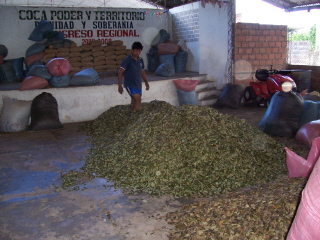Consequences of Prohibition
Drug War Issues
Politics & Advocacy

Drying the leaves in the warehouse. The sign reads ''Coca Power and Territory, Dignity and Sovereignty, Regional Congress 2006-08'' (photo by the author)
Coca is the plant from which cocaine is derived, but Bolivians have been using the coca leaf for thousands of years and consider it part of their national patrimony. Bolivia is the third largest producer of coca and cocaine, after Peru and Colombia.
Under the treaty, the other countries that are signatories have one year to consider Bolivia's reservation. Unless one-third of them -- 62 countries -- object, the reservation "shall be deemed to be permitted." That would mark the first chink in the armor of the UN anti-drug conventions, the legal backbone of global drug prohibition.
The INCB said it was "concerned that, while the denunciation itself may be technically permitted under the Convention, it is contrary to the fundamental object and spirit of the Convention." If other states were to follow Bolivia's "unprecedented" rejection of portions of the treaty, "the integrity of the international drug control system would be undermined and the achievements of the past 100 years in drug control would be compromised," the INCB said.
But the INCB's attack on Bolivia did not go unchallenged. In a joint press release Tuesday, the Transnational Institute (TNI) and the Washington Office on Latin America (WOLA) slammed the INCB for its "stubborn combination of incompetence and overreach." The board's harsh response "begs the question of why the board is so afraid," the groups said.
"Why does the board consider the international drug conventions to be so fragile?" asked WOLA senior associate John Walsh. "How do one country’s legitimate efforts to reconcile its treaty obligations with its own constitutional requirements represent an existential threat to the entire system in the eyes of the INCB?"

lime spoons, coastal Inka, Peru, mid-15th to 16th century, Metropolitan Museum of Art
The two groups noted that a stance such as the one Bolivia is taking is legal under the convention and cited the official commentary on the 1961 Single Convention: "A Party may reserve the right to permit the non-medical uses as provided in article 49, paragraph 1, of the drugs mentioned therein, but also non-medical uses of other drugs, without being subject to the time limits and restrictions provided for in article 49."
"The INCB response is another clear sign that the UN drug control regime is under strain and that the cracks in the so-called 'Vienna consensus' are approaching a breaking point," said Jelsma."It is a sign that its principal guardian, the INCB, is in distress and no longer capable of responding to challenges in a rational manner."
This work by StoptheDrugWar.org is licensed under Creative Commons Attribution-ShareAlike 4.0 International
Add new comment